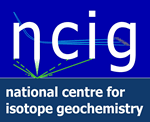National Centre for Isotope Geochemistry

The National Centre for Isotope Geochemistry at UCD (NCIG) was established in January 2009 and is located in the UCD School of Earth Sciences. This UCD Academic Centre facilitates inter-disciplinary research in trace element, radiogenic and heavy stable isotope geochemistry by academics from UCD, Trinity College Dublin (TCD), University College Cork (UCC) and the University of Galway, as well as many international collaborators.
The Centre's instrumentation was initially funded through the Science Foundation Ireland (SFI) equipment awards to a consortium of applicants from UCD, UCC and TCD. Additional funding was provided by SFI, the Higher Education Authority, the Environmental Protection Agency, UCD, TCD Department of Geology and UCC School of Biological, Earth and Environmental Sciences. Total investment in capital equipment and lab facilities, to date, amounts to more than €3M. The lab has recently installed a new Thermo Scientific Neoma instrument, with support from Science Foundation Ireland’s Research Infrastructure programme and UCD.
The NCIG is a world-class analytical facility that currently comprises two high-resolution multiple-collector inductively coupled plasma mass spectrometers (Thermo Scientific Neptune and Thermo Scientific Neoma), a thermal ionisation mass spectrometer (Thermo Scientific Triton) and two Thermo Scientific iCAP Q-ICP-MS instruments. The laboratory is also equipped with an Analyte G2 193nm Excimer laser (Teledyne Technologies) that can be coupled with one of the iCAPs, the Neptune or the Neoma instruments for in-situ analyses.
The recently commissioned (June 2024) Thermo Scientific Neoma XHR is a high-resolution MC-ICP-MS instrument equipped with MS/MS reaction gas technology. It has 10 moveable Faraday cups and 1 axial dual-mode SEM/Faraday. The ion current amplifier system has 24 slots connected by a relay matrix (eleven 10^11 ohm amplifiers and three 10^13 Ohm amplifiers).
The Thermo Scientific Neptune is an upgraded high-resolution multiple collector inductively coupled plasma mass spectrometer with nine Faraday collectors and nine ion counters. It has two low-noise 1013 Ohm resistors that are used to measure low-intensity ion beams for U-series work. It can be used in solution with a Cetac Aridus II desolvation nebulizer, or in laser-ablation mode (coupled to the Analyte G2 193nm Excimer laser).
The two Thermo Scientific iCAP Q-ICP-MS instruments are used respectively for solution-based trace element analyses of waters and acid digested geological/archaeological materials and for trace element measurements (spot and mapping) and U-Pb dating of zircon, apatite and rutile by laser ablation. One of the iCAP Q-ICP-MS instruments is also equipped for single nanoparticle detection (SP-ICP-MS) and has enabled studies on Au and Ag nanoparticle behaviour in the environment.
The NCIG laboratories at UCD recently moved to a state-of-the-art facility in UCD's Science South building. The facility includes clean labs for sample dissolution and ion-exchange separations as well as mineral separation and other sample preparation methods. Isotope ratio measurements are routinely made in the U-Pb, Pb-Pb, Rb-Sr, Sm-Nd, Re-Os systems, in a wide range of geological materials. U-series dating is carried out using the Neptune instrument which has been upgraded to include two low-noise 1013 Ohm resistors. The new Neoma instrument will greatly extend the range of isotope systems that can be investigated and coupled with the laser system will allow in-situ dating of Rb-rich mineral phases.
NCIG supports the research of four of the School’s research groups: Geochemistry, Petrology & Geochronology, Earth Resources, Marine & Earth Surface Processes and the Palaeoclimate & Quaternary Geoscience Groups. It provides a critical technology platform for several projects within the Irish Centre for Research in Applied Geosciences (opens in a new window)(iCRAG), particularly within its Earth Resources and Earth System Change challenges. Several research projects are in collaboration with the Schools of Agriculture and Food Sciences, Archaeology, Chemistry and Civil Engineering. It also contributes significantly to the laboratory analytical capacity of UCD’s Earth Sciences Institute, notably to its Climate, Water and Energy & Resources themes.